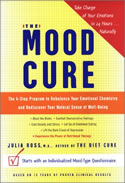|

Reviewed by Gerald Burt
 The Mood Cure: The 4-Step Program to Rebalance Your Emotional Chemistry and Rediscover Your Natural Sense of Well-Being. Published by Viking Press. Hardcover, October 2002. Available at Amazon. The Mood Cure: The 4-Step Program to Rebalance Your Emotional Chemistry and Rediscover Your Natural Sense of Well-Being. Published by Viking Press. Hardcover, October 2002. Available at Amazon.
I’ve spent years in therapy. I have prayed, meditated, exercised, attended 12-step meetings, became a vegetarian, stopped being a vegetarian, tried yoga, and anti-depressants, all to try and relieve myself of a life long case of mild depression—the kind that makes it a little difficult to get out of bed in the morning; the kind that makes you just anxious enough to keep you from really enjoying life’s experiences. No matter what I tried, the fear, anxiety and depression were always there. At 38 years of age I surrendered to the fact that I was always going to be mildly depressed.
As always, as soon as I surrendered , I found the cure to my depression within the pages of The Mood Cure by Julia Ross, M.A.
Ross, author of 1999s best-selling book, The Diet Cure, expands on her premise that diet and nutritional supplementation are key to emotional well being.
Ross claims to be able to relieve most people of their mood problems within 24 hours!
Ross, director of Recovery Systems, an addiction, mood and eating disorder clinic in Mill Valley, California, has successfully treated thousands of clients over the past 20 years using a very simple nutritional approach. An expert in brain chemistry (neurotransmitters), Ross believes that mood disorders are in fact imbalances in brain chemistry brought about because of genetics, stress or are also caused by eating the wrong types of foods.
Within The Mood Cure, Ross spells out for the reader a therapeutic approach for re-balancing brain chemistry by utilizing a combination of good-mood foods and nutritional supplementation with amino acids. Both work synergistically to promote mood-enhancing neurotransmitter function.
In The Mood Cure as well as in The Diet Cure, Ross advocates for small portions of protein and lots of nutrient-high carbohydrates with every meal. She bucks the low-fat/no-fat trend and makes a compelling argument that the brain and body need FAT to function properly. While this suggestion seems contradictory to many peoples’ thinking, Ross shows a direct cause-and-effect from the shift to low-fat, nutritionally poor carbohydrate-based diets in the 1980s to current rates of depression, obesity and food addiction today.
The dietary information in the book is well researched and contains the most current information about foods and their effect on the brain and body. Ross also educates the reader on the little known but important brain neurotransmitters that affect mood: serotonin, catecholamines, GABA and endorphins. Ross provides an easy-to-answer four-part mood type questionnaire that will give you immediate insight into your particular neurotransmitter deficiency. Based upon your answers you will discover whether:
- A lack of serotonin causes your negativity, obsessiveness, worry, irritability and sleeplessness.
- A lack of catecholamines drops you into an apathetic funk.
- A lack of GABA stresses you out and allows you to feel overwhelmed.
- A lack of endorphins makes you overly sensitive to emotional hurt.
She states that most people she sees lack all four of the mood-balancing neurotransmitters.
After reading the book and taking the questionnaire, I ran right out to my local health food store and bought my first amino. Within minutes of taking the serotonin producing amino tryptophane, I had an expansive sense of feeling OK! After a few days of feeling good, I bought GABA, a different amino that immediately relieved my anxiety. On a roll, I started experimenting with the other aminos. I now take three of the four recommended aminos and for the first time in my life I wake up enthused and I am trying things I would never have been able to do before. The beauty of Ross’ mood treatment protocol is that over time, utilizing the food suggestions with the correct amino acid therapy, your brain actually can start to produce its own good mood neurotransmitters making the supplementation unnecessary. I’ve used the aminos now for three months and can honestly say I’ve never felt better!
Ross’ treatment approach is uncomplicated and most of the supplements she recommends are easily available at most health food stores. I have recommended this book to many people and have found that my success story is typical. I truly believe this book can change lives.
For more information on Julia Ross’ book, go to www.moodcure.com.
|

